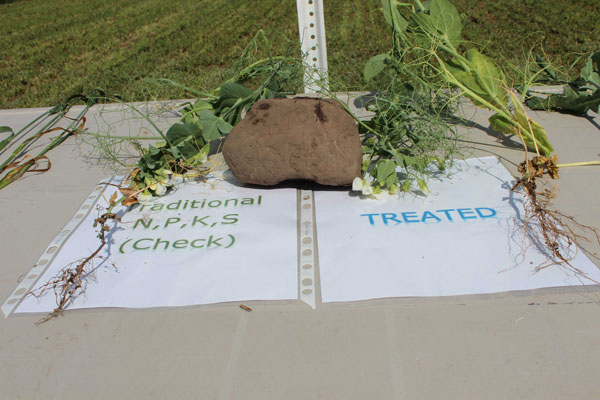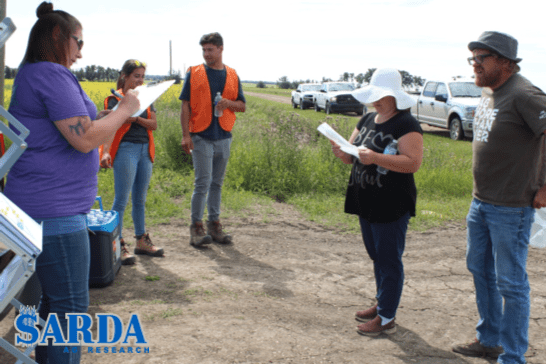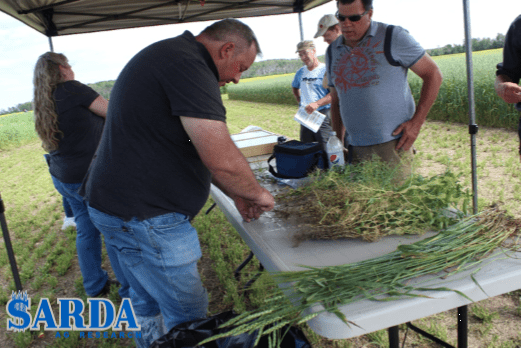With COVID-19 managing everyone’s lives, it seemed doubtful that SARDA would be able to host an event this summer. Fortunately, gathering restrictions were reduced. SARDA staff were able to showcase some of the interesting research trials they are doing, some of which are being duplicated elsewhere in the province. Plot walks, field schools, and other types of events allow Research Associations to show off their hard work. It also allows producers and industry to view the trials in the fields before the yearly results are given.
During the afternoon of July 30th, 40 producers and industry representatives came out to view the plots. Shelley Barkley, the provincial insect technician, and Dr. Micheal Harding, the provincial plant pathologists joined us. Dr. Micheal Harding brought some examples of crop diseases to show what are present in our crops locally and informed us about the conditions that favour development, their treatments, and their effect on yield and quality. Participants were invited to bring samples from their crops as well. Shelley brought a display case of several of the many insects present in the area, pointing out beneficial insects and pests. She also talked about what she found in the local fields while surveying. SARDA highlighted 3 specific trials; the intercropping trial, the biostimulant trial, and the canola seed size and seeding depth trial.
Intercropping is the new buzz word in Agriculture. It is the practice of growing more than one crop on the same piece of land at the same time. Although this is not a new practice, current research is showing improved total combined yields, improved harvestability and quality of the crops, more efficient use of fertilizer or reduced requirements for the amount of fertilizer needed, and increased soil microbe activity which is touted to improve soil health. Much of the research has been done in other agricultural zones and often includes the use of forages and/or livestock grazing. In the SARDA Ag Research trial, we are focusing on local crop types and are excluding the use of livestock or forage in the crop mixtures. The crops we are looking at include wheat, barley, lentils, peas, canola, and flax. We have the cereal combined with pulses and oilseeds combined with pulses. Because this is a relatively new way of looking at intercropping, we are exploring two different seeding rate combinations to maximize production. This is the first year of a two year trial. In the second year of the trial, a common crop will be seeded across each of the intercropping plots, to evaluate soil health conditions.
The second trial we highlighted was the biostimulant trial. As agricultural practices progress, several companies have designed growth systems that are stated to improve production. These systems include variations seed treatments, fertilizer products, growth regulators, fungicides, and top-dress products. We are comparing these systems against each other and traditional advanced management. The companies involved are partners in this trial and have provided the products needed to complete the trial work using their recommended procedures. This trial is being replicated near Lethbridge and Forestburg and will continue for two more years.

Canola crop research has created many new varieties in recent years. These hybrid varieties or cultivars have different seed sizes. The cost to purchase these new cultivars has risen substantially and is a significant cost in the production of this crop. Even with high germination and vigour, the establishment of this crop throughout the province is often around 60%. Low plant counts could lead to more weeds, uneven maturity, higher green seed counts, poorer quality, and a much more difficult crop to manage. Also impacted are time operations such as spraying and swathing. Anything that can be done to encourage the healthy establishment of this crop could reduce costs and improve production. We know from previous research, that deeper seeding of canola can affect the germination and establishment of the crop. We ask ourselves with the new larger seeded cultivars, can a producer seed the crop deeper without jeopardizing crop establishment? This question becomes very important when weather and soil conditions are very dry at seeding time. This is the first year of a three year trial that is being replicated by LARA in Northeastern Alberta and BRRG in central Alberta. Year one was wet in all locations but with the trial being continued for another 2 years, we hope to have a variety of moisture conditions throughout the trial.
For those that missed the plot walk, the site is open to be viewed until near harvest. At the entrance of the plot, please put on the disposable booties located in the mailbox. Biosecurity is very important to protect the site from accidental infection of clubroot and other soil-borne diseases. If you would like an explanation from SARDA Ag Research staff, please grab a few of your friends and neighbours, call the office and make arrangements for someone to meet you at the site. Wishing luck to all this harvest season.



